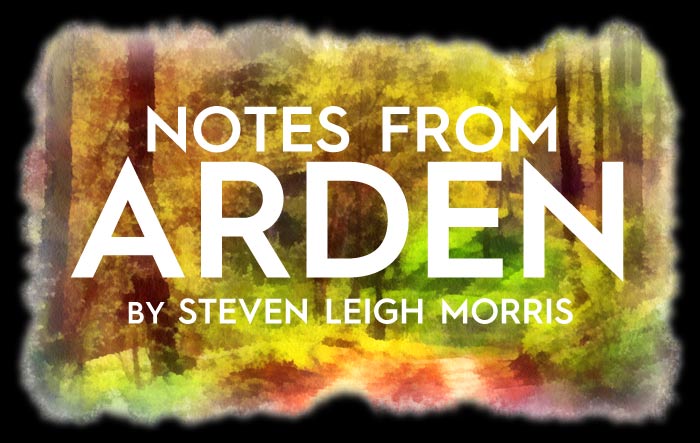NOTES FROM ARDEN
BY STEVEN LEIGH MORRIS

An Off-the-Snark Wagon Mea Culpa
This column is an apology to and defense of John Steppling, who feels rightfully miffed that his column from last week takes a rude hit this week in Stage Rows – Bill Raden’s Hedda Hopper-like roundup, dedicated to gossip around town. As Bill puts it, the goal of his column is to take local personalities and treat them as celebrities, and thus give the community a cachet it otherwise wouldn’t have.
I think Bill’s strategically low-brow idea amidst a wash of medium-to-high-brow commentary and analysis in Stage Raw is a great idea because it’s in the larger interest of community-building, of which he does a fair amount in the four incarnations Stage Rows has run. I like the column, and I like what Bill has done with it.
That said, I invited John Steppling to contribute a serious piece on the relationship of economics to the arts, which he did in good faith. The following week, he was subjected to a kind of broadside of his ideas, not by readers of Stage Raw, who certainly are entitled to react to anything they read here as they see fit, but by one of our own columnists, who was motivated by defending people in L.A., whom he had reason to believe might have been personally ridiculed by John.
Fair game, I figured. Free speech.
I don’t blame Bill, I blame myself. I allowed it to run without thinking of the larger consequences. The issue for me isn’t blocking anybody’s dissenting opinion, which would be unforgivable, but that a guest invited into our home deserves to be treated with more respect than I showed. Courtesy must be paramount in discourse, even in divisive polemics.
John did not name names in his piece. He addressed larger patterns of behaviors, which anyone who creates theater could have taken personally – describing the theater (among other forms of art and entertainment) as the uncle with halitosis who won’t take the hint. He addressed playwriting workshops that are more interested in therapy than in the larger issues confronting our culture. Again, he did not name names. Anybody who creates theater can take offense at any of that, but in the broader cultural sense, Steppling is right.
He’s right about a number of observations in his piece: the political drift towards conservatism in this country, in which former conservatives start to look like socialists, in contrast to our Right Wing of today. He’s right about the very-much-related decimation of our public education system, and the accompanying arts education that used to be part of it and was largely responsible, in days of yore, for a generation that went to arts events on field trips, establishing patterns of arts attendance that now are in precipitous decline. And finally, he’s right about the urgency of theater to offer political defiance because it can, and because, historically, with the possible exception of poetry, no other art form has rattled the cages of authority so well.
The way he intersected these ideas shows his breadth of vision, and it is among the reasons I wanted to run his piece.
But I’m wondering if the larger issue here isn’t a predisposition against John’s ideas not expressed by Bill, but by Bay Area playwright John O’Keefe, who posted on Facebook, in reaction to Steppling’s article, the view that theater and politics have no business mixing: “As soon as you become political, you are the enemy.”
(O’Keefe is the author of the spectacularly political play, Times Like These, about the diminishment of a Jewish actress in Nazi-occupied Germany. This is among the reasons his post is so odd.)
O’Keefe’s attitude is emblematic of the very American malaise Steppling wrote about in Stage Raw, as though addressing politics in the theater is some kind of disease. The United States is the only country I know of that holds such universal contempt for discussing politics directly in its works. This is among the reasons I’ve been such a long-time supporter of City Garage in Santa Monica – among a minority of producing companies in the country that has the guts to consistently defy the unspoken American ban on political discussions in works of theatrical art.
I wrote earlier in this column that in getting this new venture of ours underway, we would stumble on occasion. The callousness with which we treated John Steppling – specifically the way I treated him – was one such example. I allowed unfettered expression to trump courtesy, and I got it backwards.


